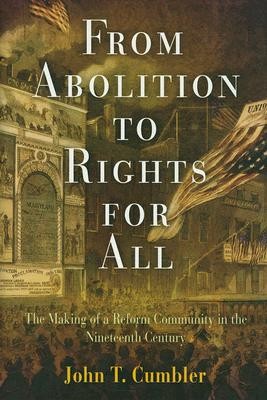| From Abolition to Rights for All: The Making of a Reform Community in the Nineteenth Century Contributor(s): Cumbler, John T. (Author) |
|
 |
ISBN: 081224026X ISBN-13: 9780812240269 Publisher: University of Pennsylvania Press OUR PRICE: $56.95 Product Type: Hardcover - Other Formats Published: October 2007 Annotation: The Civil War was not the end, as is often thought, of reformist activism among abolitionists. After emancipation was achieved, they broadened their struggle to pursue equal rights for women, state medicine, workers' rights, fair wages, immigrant's rights, care of the poor, and a right to decent housing and a healthy environment. Focusing on the work of a key group of activists from 1835 to the dawn of the twentieth century, "From Abolition to Rights for All" investigates how reformers, linked together and radicalized by their sh ared experiences in the abolitionist struggle, articulated a core natural rights ideology and molded it into a rationale for successive reform movements.The book follows the abolitionists' struggles and successes in organizing a social movement. For a time after the Civil War these reformers occupied major positions of power only to be rebuffed in the later years of the nineteenth century as the larger society rejected their inclusive understanding of natural rights. The narrative of perseverance among this small group would be a continuing source of inspiration for reform. The pattern they established--local organization, expansive vision, and eventual challenge by powerful business interests and individuals--would be mirrored shortly thereafter among Progressives. |
| Additional Information |
| BISAC Categories: - History | United States - 19th Century - Political Science |
| Dewey: 973.711 |
| Physical Information: 1" H x 6.1" W x 9.1" (1.15 lbs) 256 pages |
| Themes: - Chronological Period - 19th Century - Chronological Period - 1851-1899 - Topical - Civil War |
| Descriptions, Reviews, Etc. |
| Publisher Description: The Civil War was not the end, as is often thought, of reformist activism among abolitionists. After emancipation was achieved, they broadened their struggle to pursue equal rights for women, state medicine, workers' rights, fair wages, immigrants' rights, care of the poor, and a right to decent housing and a healthy environment. Focusing on the work of a key group of activists from 1835 to the dawn of the twentieth century, From Abolition to Rights for All investigates how reformers, linked together and radicalized by their shared experiences in the abolitionist struggle, articulated a core natural rights ideology and molded it into a rationale for successive reform movements. The book follows the abolitionists' struggles and successes in organizing a social movement. For a time after the Civil War these reformers occupied major positions of power, only to be rebuffed in the later years of the nineteenth century as the larger society rejected their inclusive understanding of natural rights. The narrative of perseverance among this small group would be a continuing source of inspiration for reform. The pattern they established--local organization, expansive vision, and eventual challenge by powerful business interests and individuals--would be mirrored shortly thereafter by Progressives. |